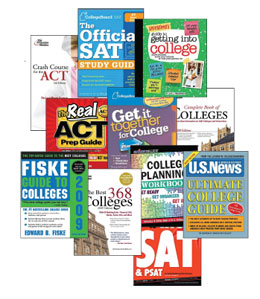One step into your 17-year-old’s room confirms she’s in the thick of the college application process. The floor is littered with college viewbooks, the calendar has so many sticky notes they obscure the current month, and the letter of recommendation from her English teacher has gone AWOL. In no time at all, your teen will be an adult and in charge of her own life; so consider the college application process an opportunity to give guidance to help smooth the process, while letting her take responsibility.
 Get organized
Get organized
The first step for simplifying college applications for both parents and students is to get organized. With so many details to manage, there’s nothing like a good old-fashioned checklist to help break down the process. Doing one thing at a time can help your teen feel less overwhelmed and more in control of the process. The National Association for College Admission Counseling (NACAC) provides a printable list of reminders for each year of high school, which you can download from its Web site. This includes a to-do list for each month of the senior year.
But the road to college doesn’t start in the senior year; it begins in the freshman year, according to David Kobzina, an admissions counselor at Portland State University. “We look at what a student does from day one. Parents can make sure their student is taking classes that help prepare them for college, and obviously good grades are important. But we don’t look at just that. We like to see students who are well rounded, and are involved in sports, student government, community service and other clubs.”
Do your research
When it comes to picking colleges to apply to, Kobzina encourages students to start with looking on school Web sites to research programs of interest. Many have videos or podcasts that show a glimpse of their academic programs and student life. But nothing can replace an actual visit.
Once your teen has chosen a few schools, parents can help by organizing a campus visit. Ann Nault, a counselor at Meadowdale High School in Lynnwood, says she sees a lot of students who want to wait until the summer between their junior and senior year to visit college campuses. “But we encourage visits in the spring of their junior year, because waiting until summer doesn’t give a true feel of the college, because the campus is not in a regular session.”
At the beginning of senior year, the application process begins to pick up speed. Nault recommends starting early. “I tell [students] to ask people for letters of recommendation early to give them enough time to do it.” Admissions officers prefer to see letters from teachers and counselors rather than coaches or employers, because they don’t know the student as well academically, Kobzina explains.
If your teen is applying for early action or early decision — which may provide a stronger chance of getting in to her first school of choice — those deadlines are usually in November, according to Nault, who advises her seniors to get all of their applications in before the end of December, regardless of due dates.
Since your teen will most likely be working on several applications — each with its own requirements and deadlines, Kobzina suggests creating a master senior-year calendar for writing down application deadlines, financial-aid due dates and test dates. Encourage a simple filing system. Whether your teenager is applying on paper or online, the NACAC suggests creating one electronic or paper file for correspondence, another file with info she’ll need to access frequently, and a third file for any pending items. “The trend is moving away from paper,” Nault explains. “A lot of students now do everything online. If they submit their application electronically, most colleges will send an email confirmation back that they’ve received the student’s information. But any school can still send out a traditional application packet, because there are some students who don’t have regular access to a computer.”
Set up meetings
Scheduling meetings with the high school counselor can help keep teens motivated throughout the process and prevent last-minute panic. Nault conducts a senior interview with each of her students, then checks in with them four or five more times in the course of the year. She says about half her students bring a parent with them to meet her, but maintains, “That’s great, but it’s important for parents to remember this is the student’s process, and the student is the one who is going to be going to school. I think gentle reminders from parents are good. But let the student do the work.”
It can seem like a balancing act for parents. How do you know when your teen needs your help or when you’re doing too much? Kobzina’s advice: Be involved with the campus visits, and if you’re going to help pay for school, make it very clear to the student exactly what you can afford. Give advice during the process, but let the student complete the application herself. And when parents and students have questions: “I always say there are no stupid questions; that’s what we’re here for. We’re here to help you.”
Katie Amodei is a Lynnwood-based freelance writer. Her 17-year-old stepdaughter is a high school senior who is in the process of applying at four different colleges in Washington state.
Resources
The National Association for College Admission Counseling
Admission Matters: What Students and Parents Need to Know About Getting Into College by Sally Springer and Marion Franck
Countdown to College: 21 To-Do Lists for High School: Step-By-Step Strategies for 9th, 10th, 11th and 12th Graders by Valerie Pierce and Cheryl Rilly









